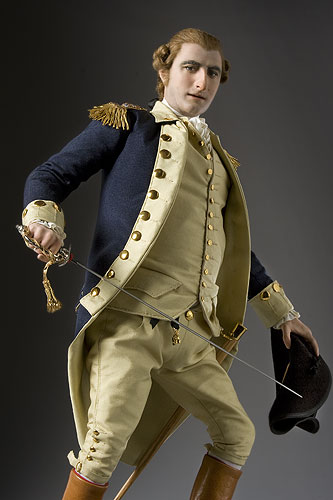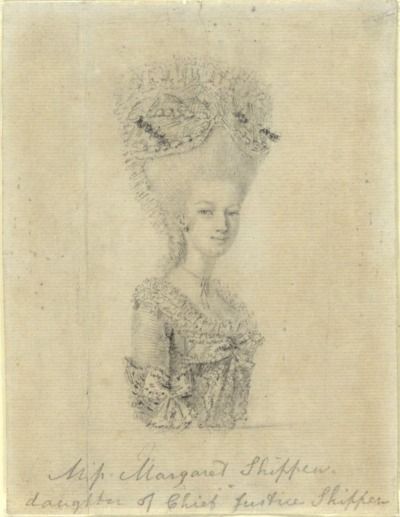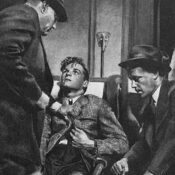Valentine’s Day is just around the corner and love is on everyone’s mind. But today, as in the past, Cupid’s arrow can occasionally go astray.

That’s what happened in 1778, when 18-year-old Philadelphia belle Peggy Shippen met 36-year-old General Benedict Arnold. Today, Arnold is known as the villainous traitor of the American Revolution, but at the time that Peggy met him, he was considered a hero of the Revolutionary War. After he led several courageous battles against the British, George Washington appointed him the military commandant, or governor, of Philadelphia, in the wake of the British withdrawal. In June 1778 the patriots welcomed General Arnold with cheering crowds, clanging church bells, and festivities. The commandant soon restored civil peace between patriots and loyalists, cleaned the debris-strewn streets, and hosted elegant parties. Despite a limp from war injuries, the handsome Arnold was widely admired.
Through mutual friends he met Peggy, whom British officers had declared “the most beautiful woman in America.” The blue-eyed blonde was born to Margaret Francis and the prominent judge Edward Shippen. Peggy’s winsome personality, though, was matched by a stubborn streak. When crossed by her parents, she refused food and drink and took to her bed until they consented.
After meeting Benedict Arnold, she fell in love. He too, was smitten. His passion, he wrote her, was “not founded on personal charms only; [but also] that sweetness of disposition and goodness of heart…[which] will ever retain the heart she has once captivated.” When Peggy announced she wanted to marry Arnold, Judge Shippen hesitated and quietly investigated the commandant’s previous life.

Superficially, Arnold seemed wealthy, for he lived in the stately Masters-Penn house, traveled in a luxurious coach-and-four, and entertained lavishly. Before the Revolution, though, Arnold had been a middle-class Connecticut apothecary, in contrast to the elite Shippens. Arnold was also eighteen years older than Peggy, the widowed father of three young children, and Judge Shippen had heard rumors about his unsavory business practices.
Nevertheless, Arnold’s August 1778 letter assured the judge he had no interest in the Shippen money. “My fortune is not large, though sufficient….to make us both happy. I neither expect nor wish one [a dowry]. My public character is well known; my private one, I hope, is irreproachable.” Ultimately the judge consented to the marriage. “From the slight knowledge I have of him to be a well-dispositioned man…one who will use his best endeavors to make P. happy,” observed Peggy’s new brother-in-law Edward Burd. On April 8, 1779, Peggy and Benedict were married in the drawing room of the Shippen townhouse.
Details about intimacy were rarely mentioned in letters, but an ecstatic Arnold confided to a friend that his lovemaking to Peggy left “no comparison” with his previous experiences.
Still, there were problems. Two months before the wedding, Pennsylvania’s Supreme Executive Council had accused Arnold of corruption. Among the charges were illegal sales of government property for his own profit, the issue of a pass to a suspected spy who traveled to British-occupied New York City, and the closing of city shops from which Arnold pocketed the profits from the liquidated goods.
After defending himself from the Council’s accusations, he appealed for help from Congress, which refused him. Already Arnold was disgruntled about its leadership. Congress, he complained, had delayed making him a Major General until 1777 in favor of younger officers. Nor had its members yet repaid the funds he invested to support soldiers in his battles of 1775-1777. Moreover, Washington refused to take sides over the accusations by the Supreme Executive Council.
Five days before the Arnolds’ wedding, the Supreme Executive Council announced a court martial to examine the accusations. One can only imagine how Arnold’s turmoil affected the bride. Political intrigues were beyond the experience of the pampered eighteen-year-old.
Since Congress failed to support him and the Council had repeatedly denounced him as a traitor, Arnold began wondering why he shouldn’t profit by becoming one. On May 1, Arnold met with Joseph Stansbury, an English émigré and writer of anti-Revolutionary poems, and offered “his services to the commander in chief of the British forces.” Stunned, Stansbury agreed to be his secret agent, traveled to New York, and explained Arnold’s offer to General Henry Clinton and his assistant, Major John Andre. Coincidentally, Andre had befriended Peggy during the previous British occupation of Philadelphia.
General William Howe, commander-in-chief of British land forces in the colonies, ultimately welcomed Arnold as a spy who sent secret information to him and Andre. Peggy not only communicated with Andre but also aided Arnold by passing treasonous documents to the British. One of those letters assured the British that Washington’s forces were too weak to attack New York City but warned of the imminent arrival of French reinforcements.
By late summer 1780 the unsuspecting General George Washington assigned Arnold command of West Point, a strategic military post on the Hudson. Promptly, Peggy’s husband moved her and their infant son to his nearby home on the river. Then, on September 22 , he met secretly with Andre on the shores of the Hudson and handed him important military papers. But on the British officer’s journey back to New York, he was captured by the patriots.
On September 25, a messenger reported back to Arnold that Andre had been captured with Arnold’s treasonous papers. Arnold flew into a panic, as that very day, several of General Washington’s aides, including the Marquis de Lafayette, General Henry Knox, and Alexander Hamilton, were to arrive at the Arnolds’ home, with General Washington expected shortly thereafter.
Terrified, Arnold “came down in great confusion and ordered a horse to be saddled …and told me to inform his Excellency that he was gone over to West Point,” recalled his aide Richard Varick. In reality, the general fled to the banks of the Hudson, boarded a boat, and escaped to the British sloop, the HMS Vulture. From there he sailed to New York City where he joined the enemy, completely abandoning his family.
Peggy, meanwhile, realized she was trapped. As Arnold’s wife, she would be questioned, possibly imprisoned, and if found guilty, hanged for treason. She formed a plan; she would become mad, jolted into insanity by the shock of Arnold’s betrayal of America. Willing herself into a frenzy, she tore at her hair and clothes and wept, her sobs accelerating into earth piercing shrieks. “Peggy was raving, distracted. She seized me by the hand …. And a wild look, then fell on her knees at my feet…” Varick recalled.
Later that day, Washington’s aides tried to question Peggy, who kept raving about a “hot iron on her head and no one but General Washington could take it off.” Even when General Washington himself later appeared, Peggy continued to behave like a madwoman. Her reaction, Hamilton wrote his fiancé, Elizabeth Schuyler, was “the most affecting scene I was ever witness to. At one moment she raved, another she melted into tears… we have every reason to believe that she was entirely unacquainted with the plan.” Stunned by Arnold’s betrayal and baffled by Peggy’s insanity, Washington and his aides decided to send her and her baby back to her parents in Philadelphia.
Once home, Peggy remained in bed for days, weeping and declaring her innocence. To the Shippens’s dismay, she seemed curiously loyal to Arnold. Her tenderness, Peggy’s parents insisted, was part of her affectionate nature and unrelated to any knowledge she had about the scoundrel she had married.
Despite the family’s protests, rumors spread through Philadelphia that the Supreme Executive Council planned to exile Peggy from Pennsylvania and send her back to Arnold. Judge Shippen tried to reason with the Council, claiming, “She is very young and possessed of qualities which entitle her to a better fate,” than being forced to return to her treacherous husband. But no amount of pleading changed the decision. On November 9, 1780, the Shippens’s carriage rolled across New Jersey reaching Paulus Hook (today’s Jersey City) on the 11th. There her father bid a tearful goodbye to Peggy and his infant grandson as they boarded a boat for New York City.
Peggy’s reaction to her exile has not been recorded. Family letters suggest that she still loved Arnold and believed his attempted delivery of West Point to the British was a courageous and noble deed. The Arnolds eventually moved to England, where they were warmly welcomed. Peggy, especially, was well-liked, but many British citizens shunned Arnold because of his dishonesty. Predictably, he never achieved much success, and upon his death in 1801, left his wife with nothing but debts. Peggy was forced to sell off many of her possessions, including her home. Yet Peggy remained on Arnold’s side. She did, however, warn a newly betrothed relative that “Marriage is but a lottery.” In one of her last letters to Judge Shippen, she admitted that because of her marriage to Benedict Arnold, “My life has been a most trying and eventful one.” She died in London in 1804.
Nancy Rubin Stuart often writes about women and social history. She is the author of Defiant Brides: The Untold Story of Two Revoutionary-Era Women and the Radical Men They Married. Visit nancyrubinstuart.com.
Become a Saturday Evening Post member and enjoy unlimited access. Subscribe now




Comments
This feature is extremely well written Nancy. The tale of Peggy Shippen and Benedict Arnold really takes the reader on quite an unexpected and seemingly far-fetched odyssey of these two lives. You state the facts of what happened in telling their story, and also have obtained quotes and additional information that bring these historical figures to life reading along.
Yet this was all real. When I used the term far-fetched above, it was not to infer any of this was either untrue of some how comical. It is neither. It is what happened. Life is full of calamities that are very serious, and this story is no exception. Occasionally there are capers in life that stop short of being calamitous (thank God) but can still be embarrassing predicaments through no faults of our own.
This story would make a great documentary. I think it’s very relatable to today. Fascinating stories are timeless.